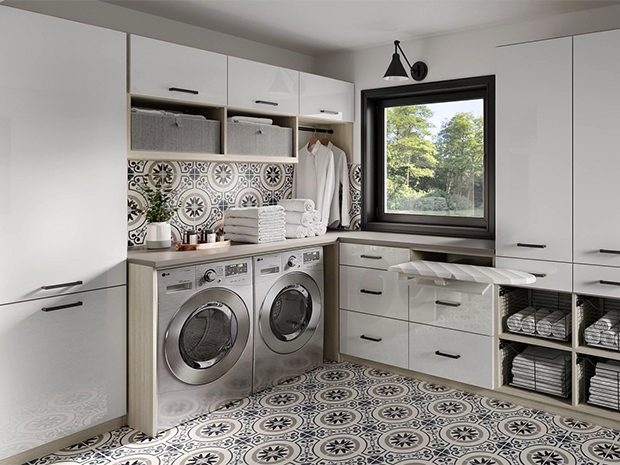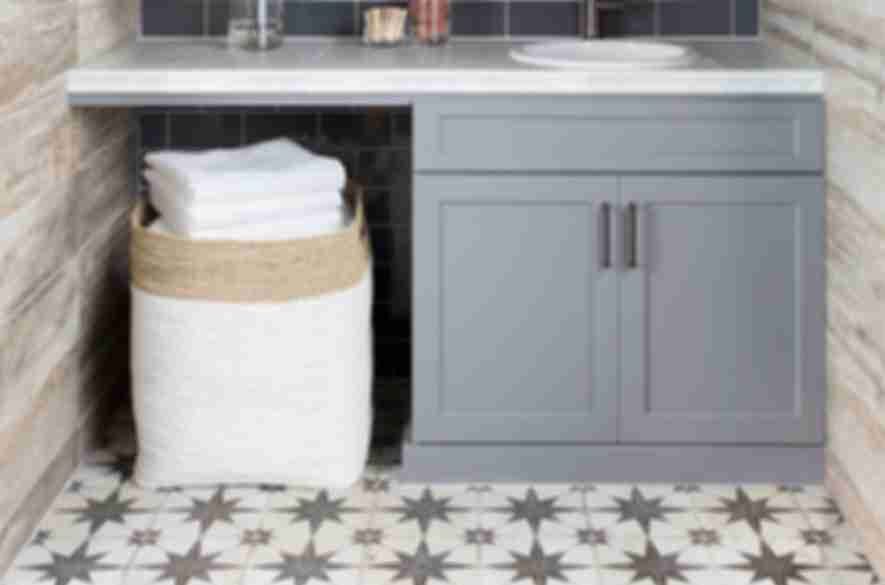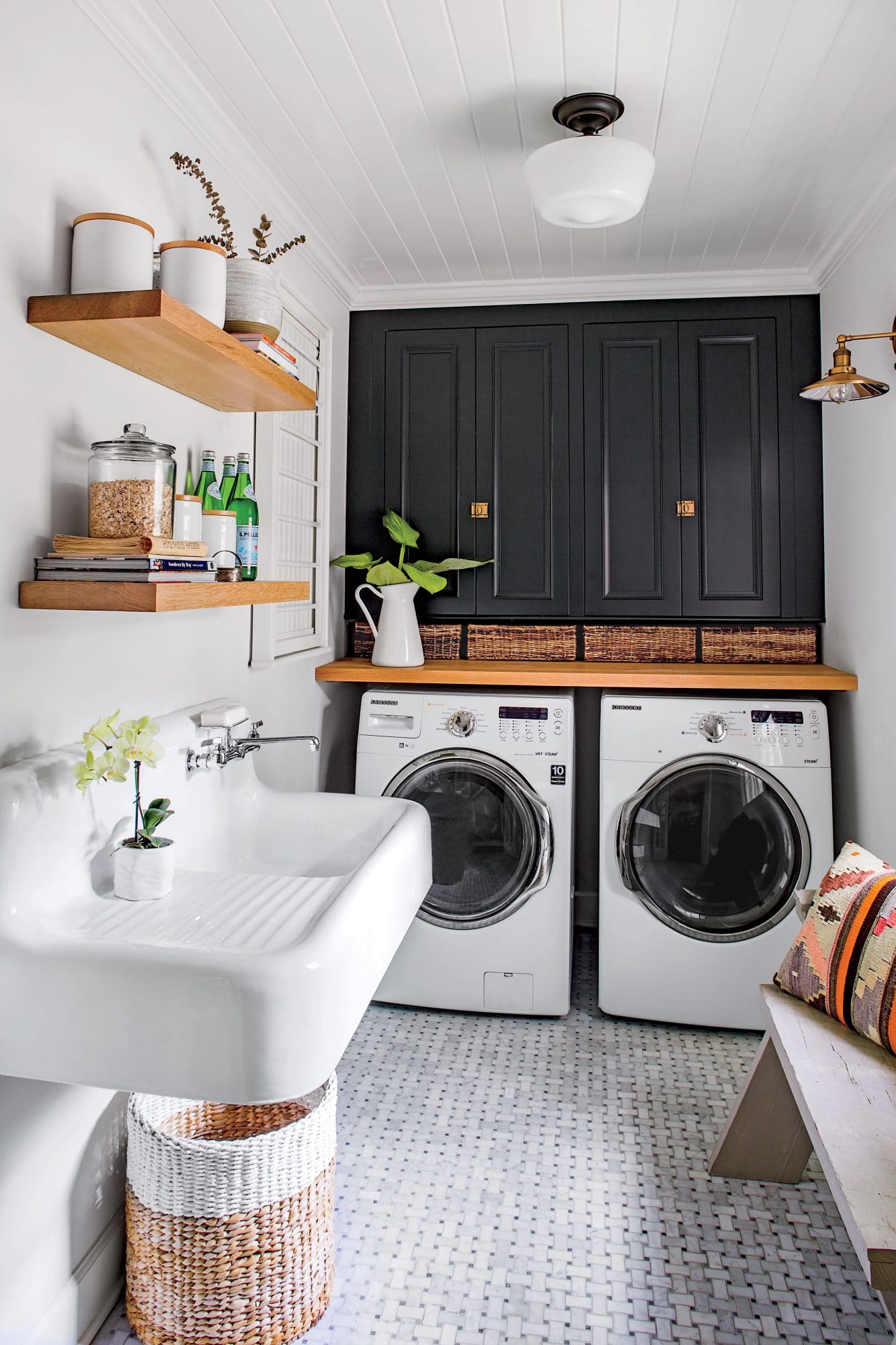When it comes to remodeling or building a new home, the laundry room often doesn’t get as much attention as other spaces. However, choosing the right laundry room tile can significantly influence both the functionality and the aesthetic appeal of this essential area. Among the various options available, porcelain tiles have emerged as a popular choice, but how do they stack up against other contenders in the world of laundry room tile flooring?
In this comprehensive guide, we delve into the world of laundry room tile, exploring why porcelain might be your best bet or when other materials could better suit your needs. We’ll compare porcelain with other popular materials like ceramic, vinyl, and natural stone, examining each option’s strengths and weaknesses in the context of a laundry room environment. Whether you’re looking for durability, style, or a balance of both, this article aims to provide you with expert advice to make an informed decision for your laundry room tile.
Join us as we navigate through the nuances of selecting the perfect tile, ensuring your laundry space is not only practical but also a reflection of your style and home’s overall design. Let’s dive into the world of laundry room tile and discover the best laundry room tile options to suit your lifestyle and aesthetics.
The Case for Porcelain as the Laundry Room Tile of Choice
When considering options for laundry room tile, porcelain emerges as a frontrunner for several compelling reasons. Its unique properties make it an ideal choice for an area that often combines high functionality with a desire for aesthetic appeal. Here’s why porcelain tile could be the perfect fit for your laundry room:
Durability and Resilience
Porcelain tiles are renowned for their exceptional durability. Made from refined clay and fired at high temperatures, they are hard, dense, and less prone to chipping and cracking compared to other materials. This robustness is particularly important in laundry rooms, where heavy appliances and frequent foot traffic are common.
Resistance to Moisture
Laundry rooms are inherently prone to moisture and spills. Porcelain’s low porosity makes it highly water-resistant, meaning it won’t absorb moisture like other materials might. This quality not only prevents damage and deterioration but also combats mold and mildew growth – a crucial factor in maintaining a healthy home environment.
Easy to Clean and Low Maintenance
Porcelain tiles are incredibly easy to maintain. They can be cleaned with a simple sweep and mop, without the need for special cleaners or treatments. This ease of maintenance is a significant plus in a laundry room, where spills of detergents and fabric softeners are likely. A quick wipe is often all it takes to keep porcelain tiles looking new.
Style and Design Versatility
With advancements in tile manufacturing, porcelain tiles offer a vast array of design choices. Whether you’re looking for a sleek, modern look or a traditional feel, there’s a porcelain tile to match. They come in various colors, patterns, textures, and sizes – including large format options that can make small laundry rooms appear more spacious.
Compatibility with Underfloor Heating
For those considering the added luxury of underfloor heating in their laundry room, porcelain tiles are an excellent choice. Their thermal conducting properties allow for efficient heat transfer, ensuring a warm and comfortable space even on the coldest days.
In sum, porcelain tile stands out as a top contender for laundry room tile flooring due to its unmatched blend of durability, moisture resistance, ease of maintenance, aesthetic flexibility, and compatibility with modern amenities like underfloor heating. As we move forward in our comparison, keep these standout qualities of porcelain in mind when weighing it against other popular flooring options.

Porcelain vs. Other Popular Laundry Room Tile Choices
In the quest for the ideal laundry room tile, it’s essential to compare porcelain with other popular flooring options. Each material comes with its own set of pros and cons, and understanding these can help you make an informed decision for your space.
Porcelain vs. Ceramic Tile
Durability and Resistance: While both porcelain and ceramic tiles are made from clay and fired in a kiln, porcelain is typically more durable due to its denser nature. It’s less prone to chipping and cracking, which is especially important in a high-traffic area like the laundry room.
Moisture Resistance: Porcelain’s low porosity gives it superior water resistance compared to ceramic. In a room where spills and humidity are commonplace, porcelain’s moisture resistance is a significant advantage.
Cost Consideration: Ceramic tiles can be more cost-effective than porcelain, making them an attractive option for budget-conscious homeowners. However, the long-term durability of porcelain might offer better value over time.
Porcelain vs. Vinyl Flooring
Comfort and Installation: Vinyl flooring is softer underfoot and can be warmer, which might be preferable in a laundry room. It’s also generally easier and less expensive to install than porcelain.
Water Resistance: Both porcelain and vinyl offer excellent water resistance. However, vinyl can be more susceptible to damage under heavy appliances, whereas porcelain maintains its integrity.
Style Options: Modern vinyl flooring comes in various styles, including those that mimic natural materials. However, porcelain still leads in terms of the sheer variety and upscale look it can offer.
Porcelain vs. Natural Stone
Natural Aesthetics: Natural stone tiles, such as granite or marble, bring a unique, luxurious look to any space. Each piece is distinct, offering patterns and textures not found in manufactured tiles.
Maintenance and Durability: Natural stone is more porous than porcelain and often requires sealing to prevent stains and water damage. Porcelain offers easier maintenance without the need for regular sealing.
Cost Implications: Natural stone can be more expensive than porcelain, both in terms of the material and installation. Porcelain offers a cost-effective alternative that mimics the look of stone without the high price tag and intensive upkeep.
In this comparative analysis, porcelain tile consistently shows its strength as a versatile, durable, and low-maintenance option for laundry rooms. Its ability to withstand the unique demands of this space, from moisture resistance to heavy foot traffic, makes it a leading choice among homeowners. As we have explored these different materials, it’s clear that each has its place in home design, but for those prioritizing longevity and ease of care in a laundry room, porcelain stands out as a particularly robust and stylish option.
Expert Tips for Choosing the Right Laundry Room Tile
Laundry Room Tile Installation Considerations
The installation of laundry room tile is a crucial step that can affect both the appearance and longevity of your flooring. Whether you opt for porcelain, ceramic, vinyl, or any other material, understanding the key aspects of installation will help ensure a successful and lasting result. Here are some important considerations when installing laundry room tile:
Professional Installation vs. DIY: Assess your skill level and the complexity of the project. While materials like vinyl might be more DIY-friendly, porcelain often requires professional tile installation due to their weight and the precision needed for cutting and laying.
Subfloor Preparation: Ensure that the subfloor is level, clean, and free of moisture before tile installation. Any cracks or unevenness should be addressed, as they can lead to tile breakage or improper setting.
Waterproofing: In a moisture-prone area like a laundry room, waterproofing is vital. Consider using waterproof membranes or backer boards, especially under less water-resistant tiles, to prevent water damage and mold growth.
Choosing the Right Adhesive and Grout: Select a high-quality adhesive that is suitable for the specific type of tile you’re using. The grout should also be appropriate for the application; for example, non-porous grout is ideal for moisture-heavy environments.
Tile Layout and Design: Plan your tile layout before beginning the installation. This is especially important for tiles with patterns or specific design features. Consider where to place cut tiles so that the layout looks balanced and aesthetically pleasing.
Allowance for Expansion: Tiles can expand and contract with temperature changes. Leave enough space between the tiles and walls for expansion to prevent cracking.
Accommodating Appliances and Fixtures: Remember to consider the placement of your laundry appliances, sinks, and any other fixtures. Ensure that tiles are cut accurately to fit around these elements seamlessly.
Curing Time: After installation, allow sufficient time for the adhesive and grout to cure fully before you start using the space. Rushing this process can compromise the integrity of the flooring.
Local Expertise: If you’re in the Houston area, consider hiring local professionals who understand the specific challenges of the region, from humidity levels to local building codes. They can also assist with choosing the best materials for your needs.
By paying attention to these key aspects of tile installation, you can achieve a functional, durable, and beautiful laundry room floor that complements your home and lifestyle. Remember, a well-installed tile floor not only enhances the aesthetics of your laundry room but also adds to the overall value and appeal of your home.
Contact the Laundry Room Tile Experts at Floors For Living
Selecting the right tile for your laundry room is a decision that combines practicality with style. Whether you choose the durable and elegant porcelain, the versatile and affordable ceramic, the comfortable and easy-to-install vinyl, or another material, your choice will significantly impact the functionality and aesthetic of this essential space.
Porcelain tiles stand out as a particularly robust option, offering unmatched durability, ease of maintenance, and a wide range of design possibilities that can elevate any laundry room from merely functional to stylishly efficient. However, every material has its unique benefits, and your final decision should align with your specific needs, lifestyle, and the overall design theme of your home.
Remember to consider factors like durability, moisture resistance, maintenance requirements, and, of course, your personal style preference when making your choice. Also, keep in mind the installation considerations and the importance of professional expertise, especially for materials that require more complex installation processes.
Floors For Living offers a wide selection of tile flooring options at our convenient Houston tile stores, along with expert advice and installation services to help you make the best choice for your home. Transform your laundry room into a modern, efficient, and beautiful space with the perfect tile flooring that suits your lifestyle and enhances your home’s value.


